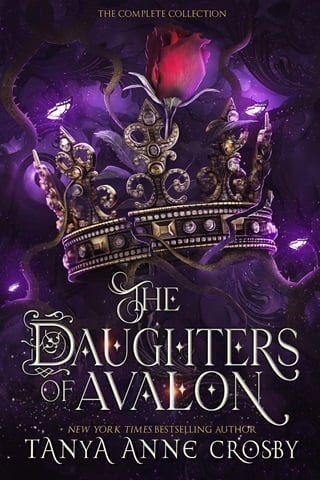Chapter 6
Six
Feeling chastised, with good merit, Elspeth lapsed into silence, listening to the clop, clop of the horse's hooves—a sound that was slowly, inexorably, lulling her back to sleep.
Sweet fates. What was this terrible languor?
Even now, seated before this stranger, she fought a new wave of sleepiness as her gaze scanned the vaguely familiar landscape—less mountainous now, with light and airy forests.
She had no idea what lay ahead, but she did know what she was leaving behind, and she swallowed her grief like a glob of sticky porridge, her emotions bedeviling her.
It wasn't merely her sisters she was taking leave of. It was Wales itself, and the spirit of the land, which was even now shedding itself from her like a mantle being stripped from her back.
If she was cross, it was because her heart ached, and Malcom seemed far too ready to taunt her. If only he understood how devastating this was. If only he could comprehend what travesty had befallen her the last time she'd arrived in this land—mayhap then he wouldn't tease her so mercilessly. It was more than twenty years later now, but she knew too much as a woman of four and twenty to feel aught but trepidation over returning to England.
She remembered only too well that journey she'd taken to London with her grandmamau. Less than six months later, she was dead.
Remember, Elspeth, never forget…
I will not forget, she promised Rhiannon. I will never forget.
And yet, unlike Rhiannon, Elspeth dared not make revenge her raison d'être. It was far more honorable to fight her mother by championing all that was good. It was for that reason she must remain Matilda's champion. Like Robert, she would do so until her dying breath. And, if, in truth, Elspeth was more invested in Matilda's cause than her sisters, it was because she believed with all her heart that if Matilda won this untenable war, only then could justice ever be served.
It aggrieved her so much that Rhiannon could not understand and forgive their half-sister. Instead, she huffed and fumed, and the more she did so, the harder grew her heart—and if there was one thing Elspeth feared in this world, it was the thought of Rhiannon following in Morwen's path. It was a terrifying visage. Already, Rhiannon had too much of their mother. In fact, but for the color of her hair and eyes, she was the spitting image of Morwen. Like their grandmother, Rhiannon bore the mark of the Mother—the crossed, amber-lit gaze that distinguished her as the regnant priestess, and the Craft was stronger with her than it ever was with Morwen. But if her sister ever learned to use her gifts with such a bitter heart, Elspeth loathed to think what might become of her.
Of all her living sisters, Rhiannon loathed their mother most, with good reason. Nestled in Morwen's womb, she and a twin had suffered a mother's worst betrayal. Having sensed the bounteous gift their grandmamau had bestowed upon the unborn twins—strong Welsh magik, powerful enough for two babes—and realizing she'd been deprived of her birthright, Morwen had concocted a potion to still their beating hearts. Rhiannon lived; the twin did not. And now, Goddess save anyone who came between her sister and her vengeance.
Insomuch as Morwen seemed to defy the tenets of their coven, and as horrible a mother as she was, the Goddess had certainly blessed her womb well enough. She'd born two sets of twins in her lifetime, and she hadn't a nurturing bone in her body. Elspeth hoped with all her heart that Rhiannon would rise above such meanness, but only time would tell.
One thing was certain. Ersinius had better stay out of Rhiannon's way. Contrary to what folks believed about witches, she couldn't turn him into a toad, but she could easily mix a powder to sprinkle in his robes and rot away his manhood, and that she would do.
Doddering old man.Annoyed by the stupidity of men and thinking about the way Ersinius used to cross himself every time they chanced to breathe the same air, Elspethshook her head.
Really, it wasn't as though any of them could raise the dead or bewitch the living. Not even Morwen had that kind of power—then, again, perhaps she did. After all, it was said she'd beguiled Henry, and whatever sway she'd held over Elspeth's father, she now appeared to hold over Stephen as well. In truth, Elspeth didn't know what her mother was capable of. She'd heard rumors of glamour spells and shapeshifting, such as was done by the Death Crone, but she'd never once witnessed any of that manner of hud du. When pressed, her grandmamau had said that all knowledge of those dark arts—if ever they'd existed—had passed away with the fall of Avalon. But, in truth, unless Elspeth ever got her hands on her grandmother's grimoire, she would never know for sure. Whatever spells she and her sisters knew, they knew by rote, after watching Morwen or her grandmother perform them. But witchcraft was not so much what people supposed. To her own people it was better known as the Craft of the Wise. And, in their native tongue they were known as dewines, not witches. Translated more precisely, they were, indeed, enchantresses, but also bards, prophets and seers, and, as with any art, not everyone had the same skills. Certainly not all were dark.Her people held the earth in great esteem and believed all beings were connected—living and otherwise. Magik was but another word for transformation, conjuration and creation and life was filled with these things—a butterfly emerging from a cocoon, a child born of a woman, a seedling emerged after a long winter, life born from a drop of water. But people were simply no longer open to miracles, even when proof existed before their eyes. Only now, in this time of persecution, this was their saving grace: People no longer believed in the Old Ways.
Elspeth cast a glance over her shoulder at her dubious savior—a minion of Stephen's. Whatever gratitude she felt toward this man, it was tempered by resentment over his unswerving loyalty to the pea-brain who'd cast their nations into war.
In truth, she was not usually so ill-mannered, but she didn't wish to like this man, even though she needed him. So, aye, it galled her that he, of all people, would endeavor to educate her about rudeness—even ruder yet was faithlessness. Whether or not he'd come to his titles after her father's death, and whether or not he'd reneged on his vows, anyone who was an enemy of Matilda's should rightfully be an enemy of Elspeth's.
Forsooth, how could he possibly approve of the way his Scots king had agreed to aid his niece, then so conveniently abandoned his support? Did he have no care at all that Stephen had no right to rule any lands, less Wales? Did it never concern him that "their king" had forced his own brother to deliver him the support of the church? Or that he'd seized the treasury without right?
The bounds of Stephen's treachery infuriated Elspeth to no end. And yet, she felt painfully ambivalent about Malcom, because, aye, she realized he could have easily abandoned her to the mercy of Ersinius' men, and if he had, he might have been justified in doing so. After all, he didn't know her, and she could have been fleeing a rightful persecution. But nevertheless, once the moment arrived, he'd pulled her onto his mount, with nary a hesitation and swept her away, holding her close—so close that she'd dared to feel… safe.
Certainly, it was the last thing she'd expected from a man she'd attempted to rob—or from a professed minion of Stephen's.
Who are you Malcom?
Peering down at the ring on his finger—closer now that his hands were on the reins and no longer resting on her person, she wondered how and when he'd acquired his lands and title. Of course, she didn't know his standard—or his name—so he must have ascended after her father's death—and therefore, he must be one of Stephen's new barons.
Men like Cael d'Lucy…
And once again, she sighed, and, for a moment, allowed herself to consider how things would have been had she stayed with her sisters…
She would have been carted away by now, and soon enough found herself wed to an Earl as well. She would have been sent back to Blackwood, where she could have ruled her own demesne, but at what cost?
But now… above and beyond the spell they'd cast, what cost would her sisters pay for Elspeth's defiance? Surely, Morwen would never suffer this insult lightly, and there was no doubt she would fly at once to the priory. She would want to know precisely what her sisters knew. But did even Rhiannon know where she was going?
With every mile she traveled, Rhiannon's voice grew fainter and fainter… and for better or worse, soon… very soon… not even she would be able to reach her.
Sweet fates. How will I bear it?
Look to your champion, Elspeth.
Champion? Elspeth dared again to peek over her shoulder and found Malcom's gaze fixed upon the horizon. At the instant, he didn't seem to sense her scrutiny, so she allowed her gaze to linger…
He had a strong jaw with a small cleft in his chin, and his eyes—blue-green—were veiled by thick, dark lashes. His skin was swarthy, as though he spent much of his time in the sun, but it was impossible to say what color his hair might be because it was covered by that coif.
Was it true? Could he be her champion?
Did you send him, Rhiannon?
Silence.
Elspeth's heart wrenched.
Rhiannon, she called again, and again, her answer was silence.
Swallowing the lump that rose in her throat, Elspeth turned as far as she could in the saddle, craning her neck as tears pricked at her eyes.
She knew the instant she passed outside her sisters' reach… because she suffered the void acutely… it was a great sweeping darkness… illumined only by the man riding at her back.
Elspeth peered up at him, tears swimming in her eyes, and prayed that, indeed, the Goddess had sent him to aid her. Without her sisters, she had no one else to trust.
"What is it, Elspeth?"
She turned, giving Malcom her back, and said, "Nothing." And once again, more to convince herself. "All is well."
 Fullepub
Fullepub 



